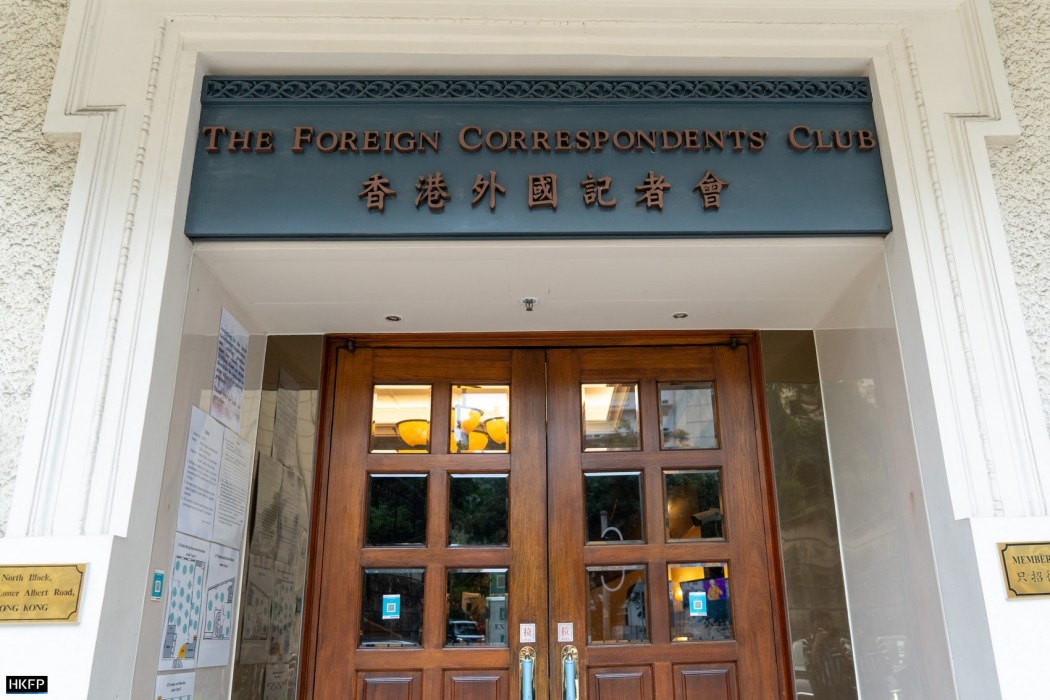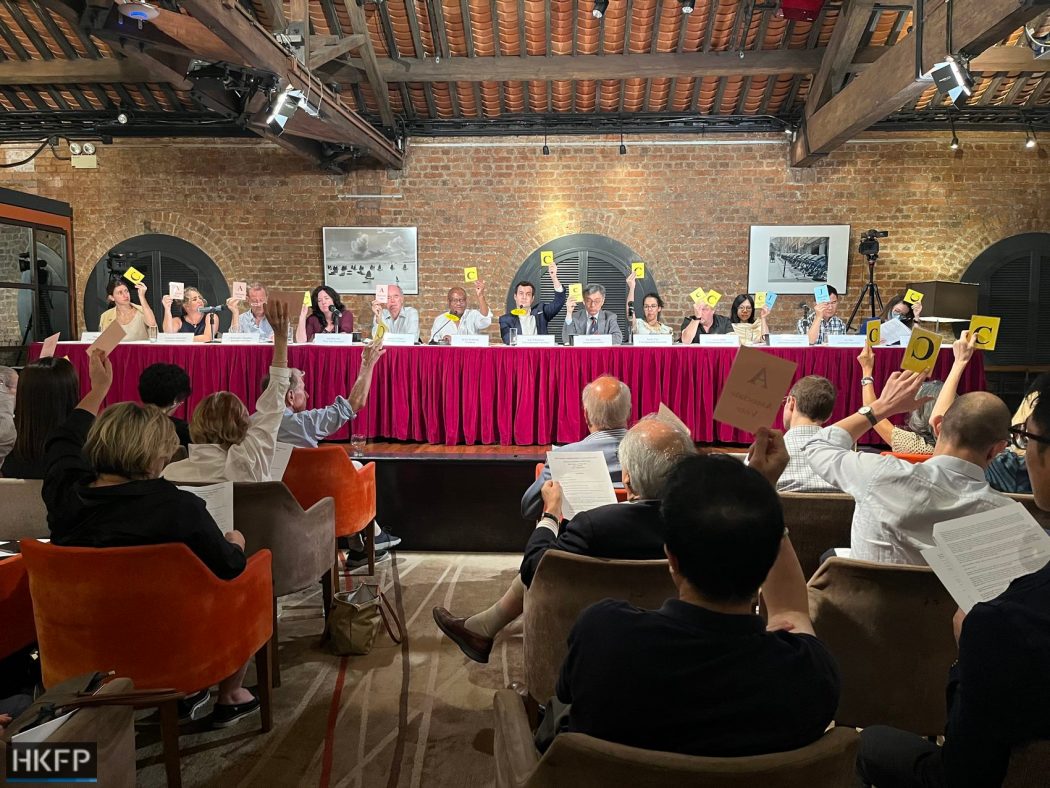Hong Kong’s Foreign Correspondents’ Club (FCC) has devised a set of guidelines for releasing statements on press freedom issues, which includes seeking legal advice and contacting government departments ahead of publishing.

Keith Richburg, whose tenure as president of the club came to an end during the FCC’s annual general meeting on Monday, told members that the guidelines would make the drafting of statements “consistent and uniform.” The meeting also saw a new board taking over the club’s leadership led by Lee Williamson, a lifestyle editor who does not come from a news correspondent background.
“All statements will be issued by the board and supported by the board, because it is the board that is the legal entity responsible for the FCC and all of its assets,” Richburg said.
Except for a statement on some media outlets being barred from reporting on a government event in April, which was issued hours before the meeting, the club had not commented on local press freedom developments in eight months.
In the past, the club’s Press Freedom Committee led efforts to write statements related to press freedom, issuing at least 8 in 2020. They ranged from responding to officials’ comments on “fake news” to condemnations of arrests relating to now-defunct news outlets Apple Daily and Stand News.
FCC members on Monday questioned the club’s commitment to expressing concerns about press freedom. This year has seen the continuation of Stand News’ sedition trial, journalists reportedly followed and a political comic strip axed after four decades.
During the meeting, several members asked if the guidelines could be shared. Richburg declined to do so on the spot, but said he would be happy to show them to members on other occasions.
The outgoing president also disagreed that having guidelines in place would slow down the process of publishing statements. Monday’s statement on the media bans came more than a month after the incident, which saw the government bar reporters – including those from Hong Kong Free Press – from covering a National Security Education Day event in April.
He said later that the statement was meant to have been published last week, but that it was held up.

“The reason for having the guidelines was so that they could put the statements up quicker, not to delay statements,” Richburg said, adding that the club had wanted to implement the guidelines before making comments on press freedom issues.
He added that the club had issued many statements in recent years because there was “a lot of stuff happening.”
“The last couple of months… the question of press freedom in Hong Kong is, it’s like a steady drip-drip-drip of what’s going on,” he said. “I don’t think we need to step up and issue a statement every time there’s some incremental change or erosion of press freedom.”
Hong Kong has plummeted in international press freedom indices since the onset of a national security law in June 2020, which criminalised subversion, secession, foreign collusion and terrorism. Watchdogs cite the arrest of journalists, raids on newsrooms and the closure of around 10 media outlets including Apple Daily, Stand News and Citizen News.
The foreign press club is open to foreign correspondents and locally-based journalists, although members who are not employed in the media – among them bankers and lawyers – make up the bulk of its membership.

Williamson, the club’s new president, said he believed the guidelines would allow the club to issue statements more regularly.
He said the reason why there was “less action” from the Press Freedom Committee over the last year was because there was no “clear process in place.”
“We didn’t have a clear roadmap… this new policy aims to correct that,” Williamson, who sat on the committee, said.
He added that the club was working on a “mechanism” through which members would be able to view the guidelines.
‘Layers of bureaucracy’
According to a preliminary copy of the guidelines seen by HKFP, the club’s board was creating a “bank of lawyers” to advise on its press freedom statements. The lawyers will review “every statement” that concerns Hong Kong.

It will also reach out to “relevant government departments” for dialogue ahead of releasing statements.
Statements can only be published if the board sees a three-quarter majority, or 13 out of 17 members voting in favour.
Some members raised concerns that the bureaucracy involved in the process would afford the club an excuse to only issue statements infrequently.
A former member of the Press Freedom Committee told HKFP that in the past, the committee would go ahead to write statements, which would then be green-lit by the board.
| 💡HKFP grants anonymity to known sources under tightly controlled, limited circumstances defined in our Ethics Code. Among the reasons senior editors may approve the use of anonymity for sources are threats to safety, job security or fears of reprisals. |
“There was never any pushback and we always could publish the statement within the day,” the member, who requested anonymity as he said his employer does not authorise him to speak, said.
“I worry that the new guidelines add layers of bureaucracy that will make it difficult to put together timely and effective statements in defence of press freedom in Hong Kong,” the former committee member added.
The FCC came into the spotlight last year when it cancelled the Human Right Press Awards after hosting it for 25 years, citing legal risks. Eight members of the club’s Press Freedom Committee, which oversaw the awards, and one of the club’s board members resigned in protest, and Richburg later apologised to the awards’ judges, saying that the club still had “a role to play.”

The government also added a new national security clause to the club’s lease when it was renewed last year, saying “standard clauses” had been introduced “to safeguard national security and to sufficiently protect the Government’s rights and interests.”
In June 2020, Beijing inserted national security legislation directly into Hong Kong’s mini-constitution – bypassing the local legislature – following a year of pro-democracy protests and unrest. It criminalised subversion, secession, collusion with foreign forces and terrorist acts, which were broadly defined to include disruption to transport and other infrastructure. The move gave police sweeping new powers, alarming democrats, civil society groups and trade partners, as such laws have been used broadly to silence and punish dissidents in China. However, the authorities say it has restored stability and peace to the city.
Support HKFP | Policies & Ethics | Error/typo? | Contact Us | Newsletter | Transparency & Annual Report | Apps
Help safeguard press freedom & keep HKFP free for all readers by supporting our team

LATEST FROM HKFP
HKFP has an impartial stance, transparent funding, and balanced coverage guided by an Ethics Code and Corrections Policy.
Support press freedom & help us surpass 1,000 monthly Patrons: 100% independent, governed by an ethics code & not-for-profit.










